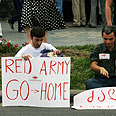
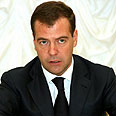
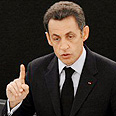
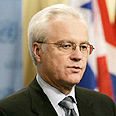
Sarkozy welcomes Russian halt in military action
French president endorses halt ordered by Medvedev, who said Russian army has 'punished Georgia and restored security for civilians in South Ossetia', ordering military to quell Georgian resistance. Meanwhile 50,000 defiant Georgians rally in Tbilisi, say 'we are united'
Medvedev said on national television that the military had punished Georgia enough for its attack on South Ossetia. Georgia launched an offensive late Thursday to regain control over the separatist Georgian province, which has close ties to Russia.
"The security of our peacekeepers and civilians has been restored," Medvedev said. "The aggressor has been punished and suffered very significant losses. Its military has been disorganized."
The Russian president, however, said he ordered the military to defend itself and quell any signs of Georgian resistance.
"If there are any emerging hotbeds of resistance or any aggressive actions, you should take steps to destroy them," he told his defense minister at a televised Kremlin meeting.
Shortly after Medvedev's announcement more than 50,000 people gathered in central Tbilisi for a rally and thousands more were streaming to the event where leading politicians were making speeches, an AFP reporter witnessed.
Defiant Georgians crammed onto the Rustaveli avenue, one of the main roads in the capital, where a sea of red and white flags hung above the crowds and people handed out free T-shirts reading: "We are together, we are united."
French President Nicolas Sarkozy, just arrived in Moscow carrying Western demands for a Russian pullback, welcomed the decision to halt the fighting but said Georgia's sovereignty, integrity and security must be protected. "What you are saying is good news," Sarkozy said after Medvedev informed of his orders, and urged him to follow through with a ceasefire.
"It is now necessary to consolidate the ceasefire," Sarkozy, the current EU president, said at the meeting. He added that "it's perfectly normal that Russia would want to defend the interests both of Russians in Russia and Russophones outside Russia. It is also normal for the international community to want to guarantee the integrity, sovereignty and independence of Georgia."
France has pushed an EU-backed peace plan, which Tbilisi has accepted, calling for an immediate truce, respect for Georgia's territorial integrity and a return to the status quo that prevailed before Georgian troops attacked South Ossetia last week.
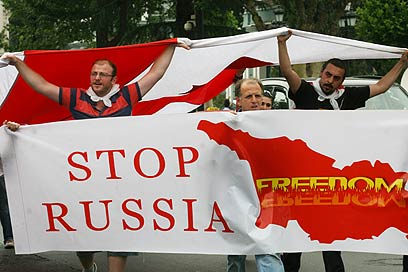
'We are united.' Rally in Tbilisi (Photo: Zvi Sheizaf)
Hours before Medvedev's announcement, Russian forces bombed the town of Gori and launched an offensive in the only part of Abkhazia still under Georgian control, tightening the assault on the beleaguered nation.
Russian Foreign Minister Sergey Lavrov said earlier Tuesday that Georgia's President Mikhail Saakashvili should leave office and that Georgian troops should stay out of South Ossetia permanently.
Moscow will not talk to Saakashvili, Lavrov said; the best thing for Saakashvili to do "would be to step down." But he said Moscow has not made Saakashvili's departure a condition for ending hostilities.
The UN and NATO had called meetings Tuesday to deal with the conflict, which blew up in South Ossetia and quickly developed into an East-West crisis that raised fears in former Soviet bloc nations of Eastern Europe. Five European presidents were headed to Russia and Georgia to mediate.
Russian troops who had advanced into Georgia on Monday from South Ossetia, took positions near Gori on the main east-west highway as terrified civilians fled the area, and Saakashvili said his country had effectively been cut in half.
Russian jets targeted administrative buildings and a street market in the center of Gori on Tuesday, Georgia's security chief Alexander Lomaia said, but there was no immediate information about casualties.
The Russians had also opened a second front in western Georgia on Monday, moving deep into Georgian territory from separatist Abkhazia. They seized a military base in the town of Senaki and occupied police precincts in the town of Zugdidi.
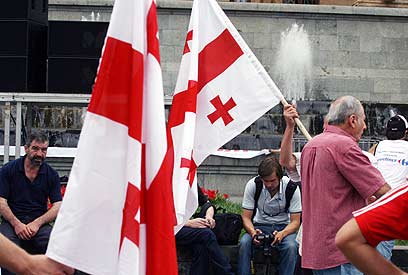
Tbilisi rally. (Photo: Zvi Sheizaf)
Russia's deputy chief of General Staff Col. Gen. Anatoly Nogovitsyn said Russian troops weren't in Gori but confirmed they have taken control of an airport in Senaki. Senaki is 30 miles east of Abkhazia.
Nogovitsyn said at a briefing that Medvedev's order means that the Russian troops would stay where they are. He said they will retaliate if come under Georgian attack.
Lomaia said that Russian troops also attacked Georgian forces who continued to hold the northern part of Abkhazia's Kodori Gorge, Lomaia said,
Abkhazian officials said their own forces were carrying out the artillery attacks and that Russian forces were not involved in that fighting. At least 9,000 Russian troops and 350 armored vehicles were in Abkhazia, according to a Russian military commander.
An AP reporter who visited Zugdidi on Tuesday morning saw several Russian armored vehicles and dozens of troops outside the town's central police station. The mood in the city was calm, people were moving around and many stores that shut previously were open for business Tuesday.
The Russian onslaught, accompanied by relentless Russian air raids on Georgian territory, angered the West, bringing the toughest words yet from US President George W. Bush.
Georgia, which sits on a strategic oil pipeline carrying Caspian crude to Western markets bypassing Russia, has long been a source of contention between the West and a resurgent Russia, which is seeking to strengthen its role as the dominant energy supplier to the continent.
Saakashvili endorsed an EU plan calling for an immediate cease-fire, in talks Monday with French and Finnish foreign ministers. Sarkozy was to negotiate the plan in Moscow, and the presidents of Poland and the former Soviet states of Ukraine, Lithuania and Estonia were headed to Georgia on Tuesday.
Bush had demanded Monday that Russia end a "dramatic and brutal escalation" of violence in Georgia, agree to an immediate cease-fire and accept international mediation.
"Russia has invaded a sovereign neighboring state and threatens a democratic government elected by its people. Such an action is unacceptable in the 21st century," Bush said in a televised statement from the White House.
Russia's Prime Minister Vladimir Putin accused the United States of hypocrisy in a tough statement that reflected both the measure of his anger at the West.
Russia's Deputy Foreign Minister Grigory Karasin said more than 2,000 people have been killed in South Ossetia since Friday, most of them Ossetians with Russian passports. The figures could not be independently confirmed, but refugees said hundreds had been killed.
Both separatist provinces are backed by Russia. Russian officials had given signals that the fighting could pave the way for them to be absorbed into Russia.
Georgia borders the Black Sea between Turkey and Russia and was ruled by Moscow for most of the two centuries preceding the 1991 breakup of the Soviet Union. South Ossetia and Abkhazia have run their own affairs without international recognition since fighting to split from Georgia in the early 1990s.















